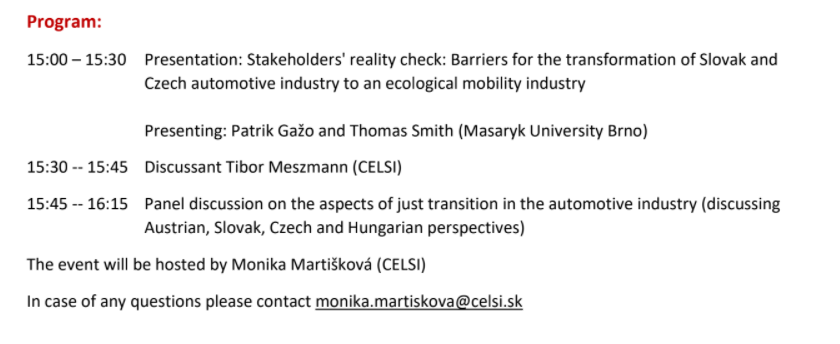News
CELSI frontiers webinar: Just transition in the automotive industry
CELSI frontiers webinar: Just transition in the automotive industry
Published on April 26, 2021

𝐎𝐧𝐥𝐢𝐧𝐞 𝐰𝐞𝐛𝐢𝐧𝐚𝐫 𝐟𝐨𝐫 𝐫𝐞𝐬𝐞𝐚𝐫𝐜𝐡𝐞𝐫𝐬 𝐚𝐧𝐝 𝐬𝐭𝐚𝐤𝐞𝐡𝐨𝐥𝐝𝐞𝐫𝐬
May 7, 2021, 15:00, online, please register here: https://docs.google.com/forms/d/e/1FAIpQLSc8_8mhBUL6T00Cgl8SZlFnGuJ_2z4PVx8vTM4XMsrJDrr3hg/viewform?gxids=7628
Around the world, the automotive industry is currently in a crucial period, which will decide on its further relevance in the coming years and decades. The crisis of car production and sales, which has intensified with the outbreak of COVID-19 in 2020, is also an opportunity to rethink the role of this industry socially and ecologically.
Economically-speaking, the automotive industry is one of the most important sectors in Central and Eastern European countries (CEE). This region is particularly vulnerable to the upcoming changes from pressures to fulfil climate goals and related changes in mobility patterns. For this reason, CEE countries such as Slovakia and Czechia are threatened by an eventual decrease in employment in the automotive industry and changing value chains in the industry
For automakers, transforming production from the production of vehicles with internal combustion engines to vehicles with electric or hydrogen propulsion seems to be a win-win situation for the industry and for the climate. However, such a crisis framing needs a reality check. What would the transition to an ecological mobility industry mean in these specific regions that rely on technologies that will no longer exist in conventional cars? Is there any discussion happening between relevant stakeholders at all?
Transformation to an ecological mobility industry might be an opportunity to preserve workplaces in the country, but it requires the active involvement of local actors. In the paper on just transition we focus on the various actors in the transition and their obstacles in influencing the strategies and direction of development of such a shift.
On the webinar, a presentation of the draft paper prepared by Patrik Gažo, Monika Martišková and Thomas Smith will be presented and discussed. The paper is based on the study of stakeholders view prepared for Rosa Luxemburg Foundation between January and March 2021.
In case of any questions please contact monika.martiskova@celsi.sk